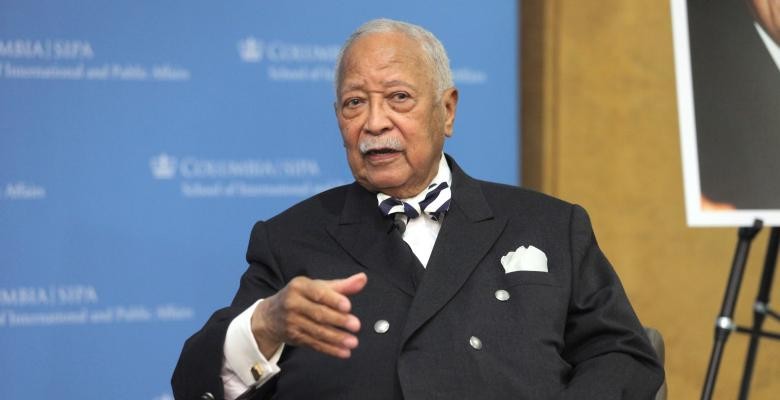Celebrating the Completion of the David N. Dinkins Archives

The life and career of New York’s first African American mayor, David N. Dinkins, is one for the history books. Now, there will be no better place than Columbia for scholars looking to write them. The David N. Dinkins Papers and Oral History Project, housed at Columbia University Libraries, has now been completed, offering researchers a wealth of material to study the 106th mayor’s contributions to politics and society.
Dinkins himself has been a professor of public policy at Columbia’s School of International and Public Affairs since 1994, when his single term ended. For 18 years, he has hosted the annual David N. Dinkins Leadership and Public Policy Forum, which invites prominent figures to campus to discuss current events. Last April’s forum featured as its keynote speaker Hillary Clinton, who delivered a major address on criminal justice reform and race.
The recent addition of 10 hours of oral history recordings, conducted by History Department fellow Megan French-Marcelin, was the final piece of the archive, warranting a celebration at SIPA on Dec. 3.
“I know people who have taken your courses, the people you bring in, and the conferences you put on,” President Lee C. Bollinger told Dinkins. “I’ve been privileged to be part of them. The way you have expressed your voice about major public issues always gives one a great feeling of hope.”
The event coincided with the 25th anniversary of Dinkins’ historic inauguration as first black mayor of the city and weeks after the city renamed the Manhattan Municipal Building at 1 Centre Street after him. Alondra Nelson, dean of social science and professor of sociology and gender studies, noted that the audience of about 100 contained “a Dinkins diaspora.”
The archive, comprised of 91 linear feet of boxes, includes speeches, fund-raising letters, campaign materials, endorsements, position papers and more, according to University Librarian Ann Thornton.
On display were a letter signed by tennis great Arthur Ashe and Gloria Steinem supporting Dinkins in his successful 1985 run for Manhattan borough president, along with his handwritten victory speech for that race; a flier for Dinkins’ 1989 mayoral race featuring a photo of Muhammad Ali and the boast that the candidate “packs a wallop”; and a letter from the mayor of the capital of Burkina Faso, congratulating Dinkins on his mayoral win.
“I cannot think of another public figure more primed for reevaluation now than Dinkins on the 25th anniversary after his inauguration,” said Thai Jones, the Lehman curator for American History at the Rare Book & Manuscript Library.
The sweep of Dinkins’ life encompasses Howard University, the Marine Corps and Brooklyn Law School, during which Dinkins worked in his father-in-law’s liquor store. Next came a series of elected and appointed positions—New York state assemblyman, Board of Elections president, city clerk and Manhattan borough president—before his 1989 mayoral victory.
His papers join a library already rich in holdings of other New York City mayors including John Purroy Mitchel (CC’1899) and Seth Low (CC’1870), who in 1901 resigned as president of Columbia to become the city’s top executive. They complement the University’s extensive collection on Harlem’s political, social and cultural history, which includes the dancing great Arthur Mitchell’s archives and the papers of poet Amiri Baraka.
Ester R. Fuchs, professor of public affairs and political science and director of the urban and social policy program at SIPA, moderated a panel with Dinkins, Nelson and Carl Weisbrod, a former member of the Dinkins administration who now chairs New York City’s Planning Commission. She asked Nelson to discuss the former mayor’s place in history.
“Mayor Dinkins’ legacy extends the work of earlier black mayors in smaller cities in the 1960s that was an outgrowth of the electoral and litigation successes of the civil rights movement and indeed the emergence of a Black Power movement,” Nelson said. “It also prefigures and shapes what would become the Obama presidency.”
Toward the end of the program, Dinkins, looking out over a sea of friends and former colleagues, said, “What I hope people will understand and appreciate tonight—and I say this to students whom I am privileged to teach— nobody but nobody gets anywhere alone. Everybody stands on the shoulders of others.”